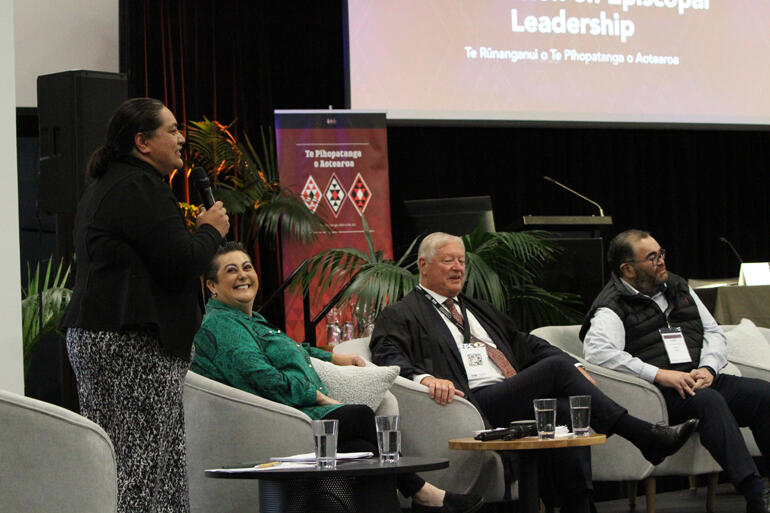A new Commission on Episcopal Leadership has gathered vital feedback from Pīhopatanga leaders in the first of many wānanga that will help guide its work moving forward.
The third day of Te Rūnanganui 2023 kicked off on Saturday morning 30 September with world-renowned theologian Kwok Pui Lan leading Bible study on Paul’s letter to the quarrelling Colossian Christians.
“If we thought joining the Jesus movement or the Christian community means we have peace, no conflict, no quarrelling, we will all be disillusioned and disappointed.” Dr Kwok said.
“But isn’t this the good news? The good news is we don’t need to be perfect.”
Prof Pui Lan went on to recall that not everybody in the community must think alike.
“We can have our own minds, our own thoughts. We can share what we hold dearest. Our Christian community should be a community that is not homogenous, but that allows different practices, different ways of believing.”
With that message of peace in the forefront of minds, talks on the future of leadership in Te Pīhopatanga o Aotearoa came next on the agenda, starting with a panel discussion from the newly formed Commission on Episcopal Leadership.
Commission chair Khylee Quince (Ngāpuhi, Ngāti Porou, Te Roroa) explained the mahi the Commission is embarking on, likening it to a systems review, or the creation of a handbook for a bishop’s journey – from appointment to the end of the tenure.
She turned to Commission panellist Bruce Gray KC who laid out where the Pīhopatanga stands on leadership now, offering a sense of urgency, “The time for the debate has come and we begin to sit down together and we say, ‘Are we one or are we many?’ and, ‘How are we led?”
Fellow panellist and Archdeacon for Mātauranga, Ven Dr Hirini Kaa, provided a brief look into the history of Anglican non-European bishops and their whakapapa to Te Hāhi Mihinare. He noted how Māori bishops are required to be expert in both Western and indigenous understandings of Church leadership.
Khylee Quince, who is the first Māori to be a dean of law as Dean of AUT law school, said the discussion would focus on the five pou necessary to build the whare for episcopal leadership to flourish: appointments, relationships, ministry, support and retirement.
The room then moved into five groups to discuss the pou, considering two sources of guidance – what the church considers that a bishop should be, and what tikanga requires of a Māori bishop.
Te Rūnanganui responses were discussed – and recorded on an online platform.
“That means the Commission can keep your whakaaro from here and will feed that back into our next steps.” said Khylee.
To view the livestream of that conversation (in parts Te Reo Māori, in parts English) go to: Te Rūnanganui in Wānanga Oranga Ake (at 2:37:45)
Next Khylee Quince interviewed visiting indigenous bishops on what they see as key leadership issues in their contexts.
Archbishop Chris Harper, Canada’s newly appointed Indigenous Archbishop
expressed his sense of reassurance that issues of leadership require energy and attention for Christians everywhere, just as they had for the Colossians in first century Asia Minor.
Archbishop Leonard Dawea said that it is important for bishops to know where their leadership stands in relation to different nations and cultures.
He said that in the Solomon Islands church leaders stand equal to cultural leaders, but that in Vanuatu for instance, bishops must navigate their roles in relationship to Government and cultural leaders first. He also shared how sometimes clashes between Christianity and culture needed to be carefully negotiated.
Archbishop Marinez Bassotto, one of two women serving as Primates in the Anglican Communion, shared her view of the strengths of women in ministry.
“I believe the added value of female leadership is in the methodology, in the ‘how’ we do things.” she said.
“The mindset, the worldview, and the way that women do things is through networking.”
Archbishop Marinez shared that at times as they raised and educated children, women necessarily turned to one another for support.
“We have to count on each other in several areas of our lives. And this is the way we do things in the church, we never do things alone. We always count on the wisdom and the experience of other women and other people in the life of the church.”
Archbishop Marinez concluded saying how important it is to take the first step to elect women into leadership, sharing how her consecration as bishop broke down barriers so that now two more female bishops have been elected in the Anglican Episcopal Church of Brazil.
The Commission on Episcopal Leadership in Te Hāhi Mihinare will continue to work with the church to identify ways to improve the conditions for episcopal ministry in Te Pīhopatanga, centred on the five pou of appointments, relationships, ministry, support and retirement.
